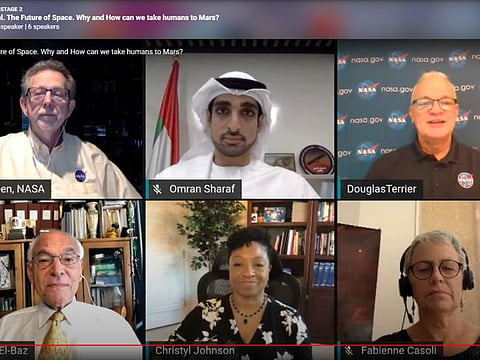Nasa scientists, UAE engineers discuss why and how we can take humans to Mars
Water resources make planet a fascinating case, say scientists

Sharjah: Life on Mars will be revolutionary and will start a whole new line of thinking, scientists said at the inaugural MENA Innovation Technology Transfer Summit (MITT Summit), organised by the Sharjah Research Technology and Innovation Park (SRTI Park) recently.
With the UAE setting its sight on the moon and Mars, leading space scientists and engineers discussed ‘Why and how can we take humans to Mars?’ at the forum. Dr. James Green, chief scientist at National Aeronautics and Space Administration (Nasa), noted Mars has water in underground aquifers and frozen glaciers and Mars 2020 Perseverance Rover, that will land on the Red Planet in February 2021, may find potential evidence of past life on Mars.
Green, who has been NASA’s chief scientist since 2018, said it is important to study the atmosphere of Mars. “It used to be a blue planet (like Earth) and its water may be down to only 13 per cent of what it used to have but it is a wonderful resource to explore the planet.”
Earlier, in a different forum, he said one promising indication of life on Mars is that every summer, the planet gets grassy, with the amount of methane gas present at the surface increasing dramatically. The Curiosity Rover on Mars also detected molecular oxygen, which increases each spring and summer by up to 30 per cent before dropping again in the fall. “That tells us life may be underground during the summer — the soils heat and therefore loosen up such that the methane can leak out. We have all kinds of circumstantial observations that perhaps Mars has microbial life too,” he explained.
Going back to the Moon
Dr. Douglas Terrier, Chief Technology Officer at Nasa headquarters, also spoke about his leadership roles at Nasa, including the development of spacecraft for NASA’s human exploration programme. Terrier said Nasa revealed this week its latest plan to return astronauts, including the first woman, to the Moon in 2024. The first flight, Artemis I, is scheduled for launch on November 2021 but will be unmanned. This will be followed by Artemis II in 2023 with astronauts on-board but will not land on the Moon before sending the first woman and the next man on the surface to the South Pole of the Moon in 2024. Terrier said: “Any future exploration will be an international collaborative effort — like the ISS (International Space Station), where astronauts are deployed in space for a long period. Our next step is to go back to moon with Artermis programme in 2024 for a longer and sustainable stay on the Moon.”
Marathon online conference
SRTI Park noted the MITT Summit was “a historic marathon online conference that connected Sharjah, Paris, Rio de Janeiro, New York and major players in the world of technology. MITT Summit brought together global investors, government and private sector representatives, experts, entrepreneurs, academics, and other relevant stakeholders for 14 hours of discussions on how to best shape the future of innovation and promote sustainability, SRTI Park said in a statement sent to Gulf News.

Inspiring the youth
For Omran Sharaf, project manager of Emirates Mars Mission (EMM) that sent the Hope Probe (the first Arab interplanetary mission to Mars), space exploration is about inspiring the youth. He noted that Hope Probe, which is expected to reach Mars’ orbit next year in time of the UAE’s golden jubilee, means the pride of the nation and the whole region.
Sharaf, one of the first engineers to join MBRSC (Mohammed bin Rashid Space Centre) has himself worked his way up through the ranks of the UAE’s burgeoning space programme. He said his mission is to inspire younger Emiratis and Arabs to pursue space exploration.
He also said Hope Probe is the realisation of the vision of the future of the UAE. Hope will be the first probe to take a detailed observation of the Martian atmosphere, including investigating how the lower and upper levels of the planet’s atmosphere are connected, and form a complete picture of how the it varies in entire Martian year.
Dr. Farouk El-Baz, Director of Centre for Remote Sensing at Boston University, said he shared the same views as Sharaf that space exploration will benefit and inspire the youth to take space studies. He noted: “Space exploration will give the youth ideas to ponder on and that is why it is important to pursue interplanetary missions, including going to Mars.









